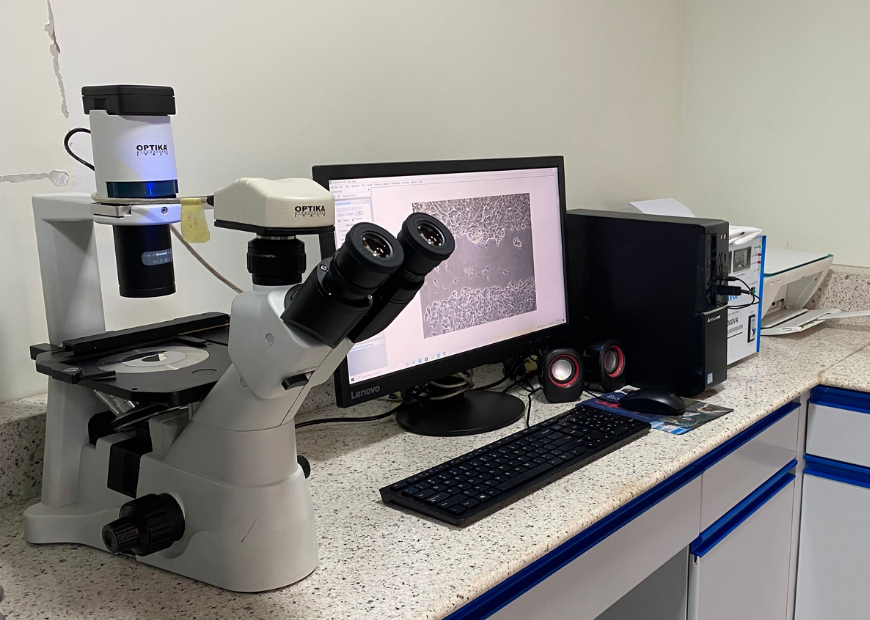Cell cultures for research in health and medicine
Championing innovation in the field of biomedical research is one of the primary goals of St. Luke’s Medical Center College of Medicine - William H. Quasha Memorial (SLMCCM-WHQM). The College, recently hailed as top 4 among Philippines’ health universities by the Institute of Research, Innovation, and Scholarship (IRIS), has made efforts to provide a competitive edge through its Basic Science Research Laboratory (BSRL).
Basic science research involving cultured cells enables the understanding of life processes at the cellular level. The cell, the basic unit of life, can be removed from an animal and then transferred to an artificial environment in the laboratory where its growth can be studied under various conditions.
Cells are observed in petri dishes that provide controlled environments for researchers to experiment on.
This kind of research is pivotal in the fields of health and medicine as its goal is to understand the basic processes in our body and how it reacts to external factors. An example of such factors are viruses and how it affects our body.
Other applications of cell culture studies include the development of pharmaceutical drugs, regenerative medicine and cancer research.
College Dean and Chief Academic Officer, Susan Pelea Nagtalon, M.D., MSPH — believes that the laboratory’s humble beginnings can pave the way for students and researchers to publish innovative studies moving forward.
“Through this lab, students and researchers can maximize tests and experiments that can greatly contribute in publishing innovative and potentially groundbreaking studies that can help improve healthcare and medicine. At SLMCCM, we always strive to provide world-class education complemented by state-of-the-art facilities,” said Dean Nagtalon.
The BSR laboratory is relatively new. It only started hosting research undertakings in the later half of 2019. This was just before the COVID-19 pandemic struck the world which greatly affected educational institutions like SLMCCM. Despite the challenges of the pandemic, however, SLMCCM continues to improve and promote the laboratory’s capability to its stakeholders, particularly to students, researchers, and the faculty.
The BSR laboratory is managed by a team of researchers and doctors specializing in basic science research.
BSR Department Head, Mark Pierre S. Dimamay, PhD., highlights that the lab’s capabilities are made possible by St. Luke’s investment in top shelf instruments and equipment for the students and faculty to use.
“The conduct of experiments using cell cultures is not possible without the best equipment that can yield the most scientifically-accurate results. The lab is currently equipped to perform aseptic techniques for mammalian cell culture, which is the process of growing animal cells in vitro inside a dish. With this capability, students will receive the best opportunity to learn molecular medicine, biotechnology, and drug discovery — all of which aims to address the current gaps in our knowledge of health and disease,” said Dr. Dimamay.
The BSR laboratory’s core equipment include an inverted light microscope, CO2 incubator, refrigerated benchtop centrifuge, and a biosafety cabinet.
While already well-equipped, the laboratory plans to acquire more equipment in the future to expand its capabilities for students to utilize. One of its target investments includes an advanced multimodal microplate reader used to measure several scientific reactions. Additionally, the cell library will be expanded to accommodate different types of cancer and non-cancer cell lines.
As Head of BSR, Dr. Dimamay envisions the laboratory to provide more opportunities and capability for students, faculty, and medical researchers in conducting biomedical research.
“By investing in the BSR laboratory’s capabilities, we envision the laboratory to be a nationally-competitive research center for studies involving cell cultures moving forward. We hope that through these continued efforts, students, faculty, and researchers can consistently produce quality and innovative research studies that can greatly contribute to medicine and healthcare.”
For education and BSRL-related inquiries, please contact the St. Luke’s College of Medicine at info@slmc-cm.edu.ph or call 8723-0101/8727-7609.





